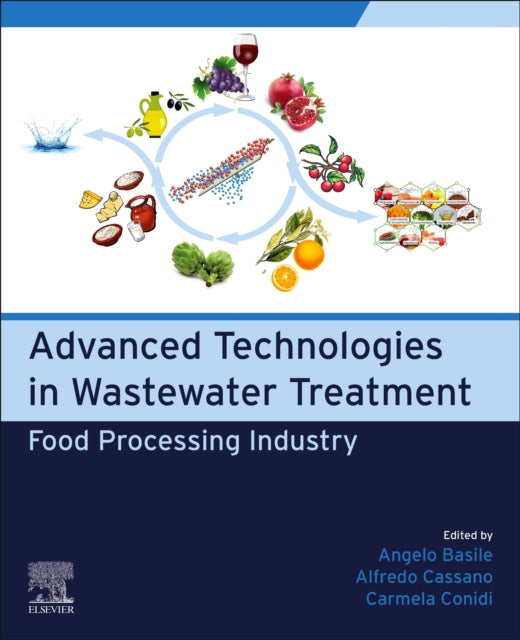Shulph Ink
Advanced Technologies in Wastewater Treatment: Food Processing Industry
Advanced Technologies in Wastewater Treatment: Food Processing Industry
YOU SAVE £22.05
- Condition: Brand new
- UK Delivery times: Usually arrives within 2 - 3 working days
- UK Shipping: Fee starts at £2.39. Subject to product weight & dimension
Bulk ordering. Want 15 or more copies? Get a personalised quote and bigger discounts. Learn more about bulk orders.
Couldn't load pickup availability
- More about Advanced Technologies in Wastewater Treatment: Food Processing Industry
Food production and agricultural activities generate a lot of wastewater that contains nutrients, organic carbon, nitrogenous organics, inorganics, suspended and dissolved solids, and high biochemical and chemical oxygen demands. Advanced technologies such as oxidative and anaerobic processes, ion exchange, membrane-based operations, adsorption/bio-sorption, and advanced biological treatment are used to provide safe and clean water and recover primary resources from food processing wastewaters. Innovative and affordable solutions are proposed for the fruit and vegetable processing industry, fishing industry, meat and poultry industry, dairy production, and oil and fat processing.
Format: Paperback / softback
Length: 362 pages
Publication date: 01 December 2022
Publisher: Elsevier - Health Sciences Division
Wastewaters produced from food production and agricultural activities are a significant source of environmental pollution due to their abundance of nutrients, organic carbon, nitrogenous organics, inorganics, suspended and dissolved solids, and high biochemical and chemical oxygen demands. The treatment of these wastewater streams poses significant challenges, as they require advanced technologies to ensure safe and clean water reuse.
In recent years, there has been a growing interest in developing innovative and affordable solutions for treating food processing wastewaters. One of the emerging technologies in wastewater treatment is oxidative and anaerobic processes. These processes include flotation, coagulation, sedimentation, filtration, adsorption, primary settling, secondary activated sludge, anaerobic digestion, ion exchange, membrane-based operations, adsorption/bio-sorption, and advanced biological treatment.
Oxidative processes, such as ozone and UV radiation, are effective in removing contaminants from wastewater. They break down organic compounds and remove color, odor, and nutrients. Anaerobic processes, on the other hand, involve the breakdown of organic matter in the absence of oxygen. These processes can produce biogas, which can be used as a renewable energy source.
Ion exchange is a process that involves the removal of ions from wastewater by exchanging them with a suitable resin. This process is commonly used to remove heavy metals, such as copper, lead, and zinc, from wastewater. Membrane-based operations, such as reverse osmosis and ultrafiltration, are used to remove small particles and contaminants from wastewater.
Adsorption/bio-sorption is a process that involves the use of adsorbent materials, such as activated carbon or biomass, to remove contaminants from wastewater. This process is particularly effective in removing organic compounds and pathogens. Advanced biological treatment, such as activated sludge processes and biofiltration, is used to remove organic matter and nutrients from wastewater.
In addition to these advanced technologies, the integration of these technologies with process intensification strategies is being considered. Process intensification involves the optimization of wastewater treatment processes to reduce energy consumption, water usage, and waste generation. This can be achieved by improving the efficiency of existing processes, such as by using optimized feed rates and operating conditions.
Innovative and affordable solutions are proposed in the field of fruit and vegetable processing industry, fishing industry, meat and poultry industry, dairy production, oil and fat processing. For example, in the fruit and vegetable processing industry, innovative solutions such as integrated fruit and vegetable processing systems, which combine washing, sorting, and processing operations, can reduce water consumption and waste generation. In the fishing industry, innovative solutions such as closed-loop aquaculture systems, which recycle water and reduce waste, can be implemented. In the meat and poultry industry, innovative solutions such as anaerobic digestion systems, which convert animal waste into biogas, can be used to reduce waste generation and energy consumption.
In conclusion, the treatment of food processing wastewaters is a complex and challenging task that requires advanced technologies and innovative solutions. By implementing these technologies and integrating them with process intensification strategies, we can ensure safe and clean water reuse, recover primary resources from food processing wastewaters, and reduce the environmental impact of food production and agricultural activities.
Dimension: 235 x 191 (mm)
ISBN-13: 9780323885102
This item can be found in:
UK and International shipping information
UK and International shipping information
UK Delivery and returns information:
- Delivery within 2 - 3 days when ordering in the UK.
- Shipping fee for UK customers from £2.39. Fully tracked shipping service available.
- Returns policy: Return within 30 days of receipt for full refund.
International deliveries:
Shulph Ink now ships to Australia, Belgium, Canada, France, Germany, Ireland, Italy, India, Luxembourg Saudi Arabia, Singapore, Spain, Netherlands, New Zealand, United Arab Emirates, United States of America.
- Delivery times: within 5 - 10 days for international orders.
- Shipping fee: charges vary for overseas orders. Only tracked services are available for most international orders. Some countries have untracked shipping options.
- Customs charges: If ordering to addresses outside the United Kingdom, you may or may not incur additional customs and duties fees during local delivery.


